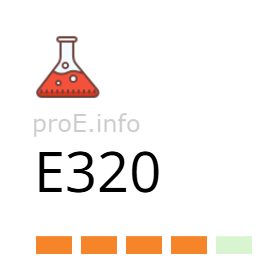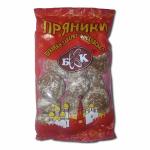
Other names for the additive (synonyms)
General Information
Food additive E320 (butylated hydroxyanisole, BHA) is a synthetic antioxidant that inhibits the oxidation of fats and oils, slowing rancidity and extending the shelf life of products. Additive E320 does not occur naturally and is considered a fully synthetic substance.
Chemically, E320 is a mixture of two isomers: 2-tert-butyl-4-hydroxyanisole and 3-tert-butyl-4-hydroxyanisole. The empirical formula of the mixture is C11H16O2.
In terms of physical properties, E320 is a waxy solid, practically insoluble in water but well soluble in fats and organic solvents (ethanol, methanol, propylene glycol).
Historically, E320 was introduced into the food industry in the second half of the 20th century as a replacement for natural antioxidants where higher thermal stability was required. For food use, E320 is produced from 4-methoxyphenol (anisole) and isobutylene, followed by purification to food-grade quality. Detailed purity and identity requirements are outlined in Regulation (EU) No. 231/2012 and JECFA specifications.
Effects on the Body
Benefits of E320
E320 is not a naturally occurring nutrient for humans and does not provide direct physiological benefits.
Risks of E320
When ingested, E320 is generally rapidly absorbed in the gastrointestinal tract, metabolized (forming glucuronides, sulfates, and free phenols, including TBHQ), and excreted mainly via urine and/or feces.
E320 is considered to have low toxicity for short-term exposure. In certain laboratory studies (in vitro), the additive and its metabolite TBHQ showed potential activity that could damage cells, but only under specific conditions when the so-called pro-oxidant mechanism is triggered. This means the effect is threshold-dependent and does not occur consistently.
Today, leading regulators (EFSA, FDA) do not consider these findings sufficient to ban the additive. They emphasize the importance of adhering to established safe intake levels.
Several long-term rodent studies reported proliferative changes in the forestomach (hyperplasia, papillomas, and carcinomas) at high doses of E320. Based on these studies, JECFA and the European Commission's Scientific Committee on Food (SCF) set a temporary acceptable daily intake (ADI) of 0.5 mg/kg body weight per day in 1989.
However, humans do not have a forestomach, and the European Food Safety Authority (EFSA) in 2011 revised the assessment, noting that, given the lack of concern regarding genotoxicity and reproductive toxicity data, the additive is considered safe when used within recommended intake levels.
The EFSA Panel on Food Additives and Nutrient Sources Added to Food (ANS) established an acceptable daily intake (ADI) of 1.0 mg/kg body weight per day based on a NOAEL of 100 mg/kg body weight per day in rats with an uncertainty factor of 100. At such doses, rats showed growth restrictions, increased mortality, and behavioral changes.
In its report, EFSA noted that at current usage levels, refined intake estimates of E320 are generally below the established ADI.
The International Agency for Research on Cancer (IARC) classifies E320 as a possible human carcinogen (Group 2B), reflecting limited animal data and no conclusive human data. This classification does not contradict EFSA's conclusion regarding adequate safety margins under current usage.
Uses
In the food industry, E320 is used as an antioxidant and preservative. It is added where there is a high risk of lipid oxidation: in fat spreads, butter and margarine, nut pastes, snack products, dry breakfasts, soup concentrates, dry mixes, confectionery (including chocolate and fillings), meat products and semi-finished products, and chewing gum. E320 is often combined with other antioxidants (e.g., E321) for a synergistic effect and better thermal stability.
E320 is effective at low doses, stable to heat and light, and well distributed in the fat phase. Manufacturers adjust doses according to the product matrix to remain below regulatory limits and avoid affecting the taste and aroma of the final product.
Legislation
E320 (butylated hydroxyanisole, BHA) is permitted in many countries, with a general trend toward approval under strict compliance with usage limits.
In the European Union, it is approved as an antioxidant, with its use regulated by Regulation (EU) No. 231/2012 and Regulation (EC) No. 1333/2008.
The European Food Safety Authority (EFSA) has established an acceptable daily intake (ADI) of 1.0 mg per kilogram of body weight. According to EFSA estimates, actual intake of this additive generally does not exceed this threshold.
In the United States, the FDA considers E320 as a substance "generally recognized as safe" (GRAS) when used within established limits and only in certain product categories.
In Ukraine and CIS countries, the additive is also permitted, with restrictions on product types and maximum allowable doses harmonized with European standards.
